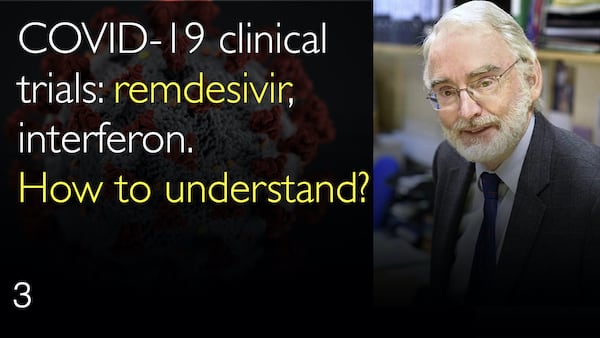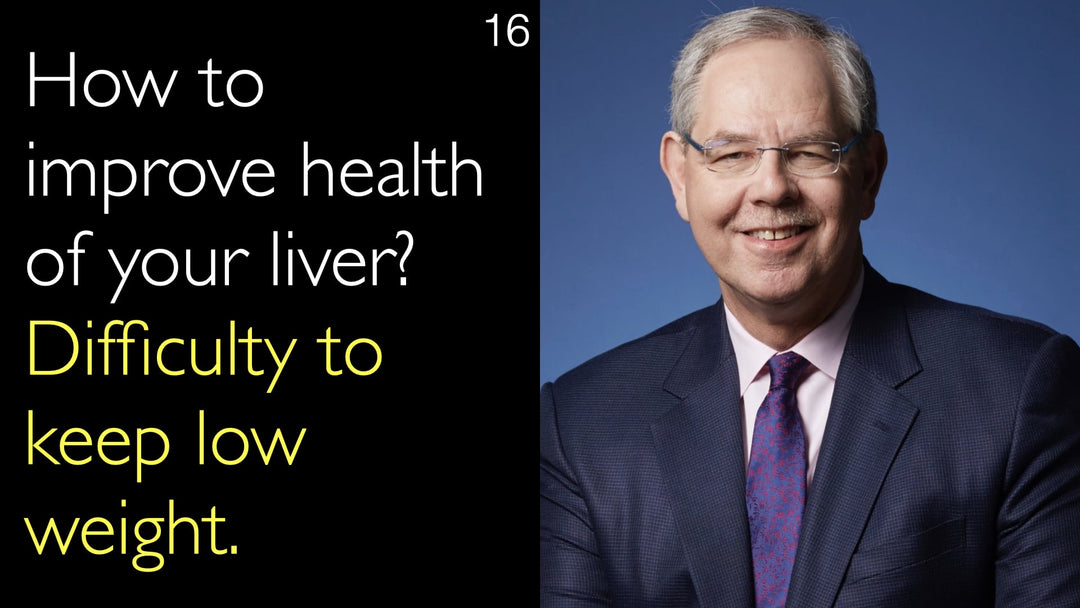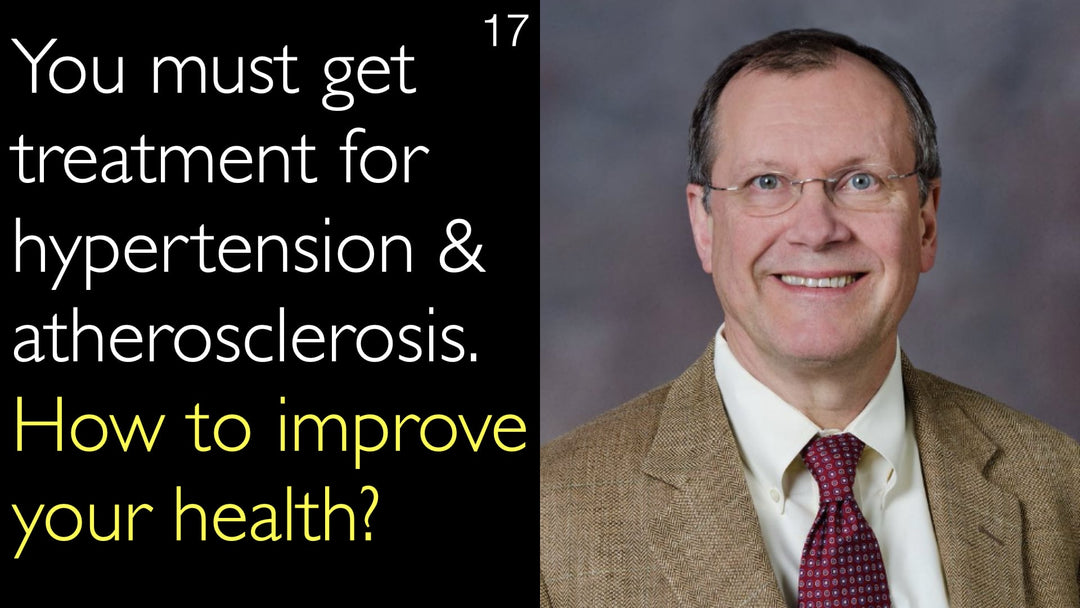Leading expert in clinical trials and pharmacoepidemiology, Dr. Stephen Evans, MD, explains the most promising COVID-19 treatments. He analyzes early data from remdesivir and interferon trials. Dr. Evans details why timing of antiviral treatment is critical. He discusses the limitations of current clinical trial evidence. Dr. Evans also clarifies which repurposed drugs currently lack supporting data.
Understanding COVID-19 Clinical Trials: Remdesivir, Interferon, and Emerging Treatments
Jump To Section
- Promising COVID-19 Treatments
- Remdesivir Clinical Trial Data
- Timing of Antiviral Treatment
- Interferon Therapy Evidence
- Treatments Lacking Evidence
- Future Treatment Directions
- Full Transcript
Promising COVID-19 Treatments
Dr. Stephen Evans, MD, discusses the most promising COVID-19 treatments currently under investigation. He notes that while over 1500 clinical trials are registered, few have reported conclusive results. Dr. Stephen Evans, MD, explains that antiviral drugs targeting the SARS-CoV-2 virus directly show particular promise. These include remdesivir and interferon-based therapies.
Dr. Stephen Evans, MD, emphasizes that treatments fall into two main categories. Some medications target the virus itself, while others address the symptoms caused by the viral infection. The most promising approaches currently involve direct antiviral action. However, proper timing of administration appears critical for these treatments to be effective.
Remdesivir Clinical Trial Data
Dr. Stephen Evans, MD, provides detailed analysis of remdesivir clinical trial results. He discusses trials conducted in China that were stopped early due to recruitment challenges. The Chinese trial published in The Lancet was underpowered to detect significant differences in outcomes.
A larger NIH-sponsored trial compared remdesivir with placebo across multiple countries. This trial showed differences in time to recovery, though mortality differences were marginal. The data from these trials led the FDA to grant emergency use authorization for remdesivir. However, Dr. Stephen Evans, MD, notes the company itself hasn't conducted placebo-controlled trials, instead comparing 5-day versus 10-day treatment regimens.
Timing of Antiviral Treatment
Dr. Stephen Evans, MD, explains why timing is crucial for antiviral COVID-19 treatments. He notes that viral load peaks around the time symptoms appear. Antiviral drugs like remdesivir must be administered early to prevent viral replication.
Dr. Stephen Evans, MD, states that giving treatment too late may be ineffective because the virus has already multiplied extensively. This creates challenges since patients typically present for care after symptoms have developed. Subgroup analyses suggest better outcomes with earlier treatment, though these comparisons aren't randomized. The ideal scenario would involve treating people before symptom onset, but this requires early diagnostic indicators.
Interferon Therapy Evidence
Dr. Stephen Evans, MD, discusses evidence supporting interferon therapy for COVID-19. He references a Hong Kong trial combining injectable interferon with two anti-HIV drugs. This study compared interferon plus HIV drugs against HIV drugs alone.
The trial showed real benefit in recovery time, though mortality benefits weren't statistically significant due to small sample size. Dr. Evans mentions a UK trial investigating inhaled interferon beta delivered directly into the lungs. This approach could potentially provide more targeted therapy with fewer systemic side effects. Interferon represents one of the few repurposed drugs with some convincing evidence for COVID-19 treatment.
Treatments Lacking Evidence
Dr. Stephen Evans, MD, clarifies which COVID-19 treatments currently lack supporting evidence. He states that hydroxychloroquine shows no proven benefit in randomized trials. Similarly, azithromycin and the combination of these medications lack evidence for effectiveness.
The two anti-HIV drugs tested in various regimens also show no demonstrated efficacy against COVID-19. Dr. Stephen Evans, MD, emphasizes that while these medications work for their intended conditions, they haven't shown benefit for coronavirus infection. He notes the importance of relying on randomized trial evidence rather than anecdotal reports when evaluating treatment options.
Future Treatment Directions
Dr. Stephen Evans, MD, discusses potential future directions for COVID-19 treatment research. He suggests that different treatments might be valuable at various disease stages. Antiviral therapies likely work best early in the infection course.
Later in the disease, anticoagulation approaches might address coagulation disorders caused by viral damage. However, Dr. Evans stresses that randomized trial evidence is still needed for these approaches. He anticipates that other antiviral treatments beyond remdesivir and interferon may emerge as more trial results become available. The medical community continues to search for effective treatments targeting both the virus and its complications.
Full Transcript
Dr. Anton Titov, MD: Professor Evans, there are more than 1500 COVID-19 related clinical trials registered at clinicaltrials.gov website. What clinical trials on COVID-19 treatments do you consider most promising today?
Dr. Stephen Evans, MD: The trials that have reported so far have not really given, in any situations, full results. There were a number of trials of the treatment remdesivir. The first two of these trials were done in China, and both ended up stopping because the number of patients they could recruit who had been admitted to hospital with COVID-19 symptoms had fallen such that they couldn't recruit. The epidemic was moving on.
One of those trials has reported and is reported in The Lancet. Another much larger trial sponsored by the NIH, but not just done in America—done in Europe and elsewhere in the world—also compared remdesivir with a placebo. It has not yet, certainly on this date as far as I'm aware (the 20th of May), reported its results other than in a press release from the NIH.
But the data that have been supplied to the FDA have allowed them to grant remdesivir an emergency use authorization. The company making the drug has not done any placebo-controlled trials itself, as far as I can tell, and there are none registered with the company as a sponsor. But they have compared two different treatment regimens of five days and ten days treatment with the drug and have done quite large numbers of those.
Those trials do not show you whether remdesivir actually does any better than nothing. It just shows you whether there is a difference between five days and ten days treatment. You can count the number of people who have serious adverse effects and make a historical comparison or a comparison in your mind to say whether it is seen to be safe.
The data from those trials combined with the data from the placebo-controlled trials obviously was enough for the FDA to grant emergency use authorization. They did not give it a license for marketing, saying that the evidence was sufficiently convincing to make the company allowed to sell it as being effective in COVID-19.
They found differences that were in the time to recovery. The differences in mortality between those treated and those untreated was only marginal. The Chinese trial was one that we would call underpowered—it did not recruit enough people to show whether there was a real difference either in time to recovery or in mortality.
The results were simply too uncertain. It's not right to say that the trial in China and the trial from NIH were contradictory in the fact that the NIH trial found evidence of benefit in recovery time and the Chinese trial didn't. It's just that the Chinese trial was too small to detect a difference. But it also didn't find any difference in mortality.
Whereas the NIH trial found a slight difference in mortality that, if it were real, would be of benefit. But again, it was in the press release, at least, underpowered to determine whether there was a genuine benefit in mortality.
The other thing with these drugs—remdesivir in particular, but also a number of other drugs—is that they are intended to attack the virus directly, rather than attacking the symptoms that the virus causes. Some drugs are targeted at the virus, and some are targeted at symptoms. But for the antiviral drugs like remdesivir, they're targeted at the virus.
The consequence is that if you give the treatment too late in time, the virus has multiplied so much in a patient that it's too late to prevent the symptoms. For a number of treatments that are intended to knock the virus, you have to give it early on in the course of the disease.
Sometimes the results have been split up to produce subgroups that divide people into those who got the treatment early and those who got it late. As you might expect, those who get the treatment early after symptoms have occurred—if the drug is effective against the virus—it will do better than those who got the treatment later.
Of course, you can't randomize people to get treatment early or late; you're going to just have to accept that. So these subgroup analyses are not any longer based on a random comparison. They have to be treated with a great deal of caution. But in this instance, it is entirely reasonable to think that giving treatment early will have bigger benefits than giving it later.
The problem slightly with this is that we know now that the virus is probably at its maximum just prior to symptoms appearing or just around the time of symptoms appearing. Infections, as it happens, is also at a maximum then, which is partly why the virus has spread around the world.
So we weigh the consequences that you may have to give treatment. Ideally, you will give the treatment to people before they had any symptoms. Then you might be able to stop the virus replicating and stop them from getting symptoms. But you want to give it very early.
People don't go to the hospital until they've had symptoms for a little while. This is a difficult situation. If we were able to test people early, or we had really good diagnostic indicators of early onset of COVID-19, then we could do trials in there.
For example, if we could do trials in everybody who got a sudden onset of taste and smell and who may have COVID-19, we might find that these drugs were really very effective, and we wouldn't necessarily have to treat large numbers.
The same kind of pattern has been seen in a trial of interferon that was run in Hong Kong. Injectable interferon was given there together with two drugs that were given in HIV. In the Hong Kong culture, you can't really easily run a trial with placebo.
Both groups got the two anti-HIV drugs, while the group with interferon—the group with interferon had interferon plus the HIV drugs, and it was compared with the HIV drugs alone. Again, this study was quite small. It showed real benefit in recovery time, but it didn't show sufficient benefit in mortality for it to be statistically significant.
But this was intended as a small trial and was intended to move on to another trial. In the UK, there is another trial of interferon beta, but not being given by injection—because that drug is given by injection to patients with multiple sclerosis. It's a trial of interferon beta given directly into the lungs by inhalation, but we haven't got the trial results from that.
Both remdesivir and interferon beta are the two treatments for which we have some evidence of their being successful. For hydroxychloroquine, so far we have no evidence. For azithromycin so far, we have no evidence. For the combination of them, we have no evidence.
For the two anti-HIV drugs, so far we do not have evidence that they are effective in randomized trials in COVID-19. They may be undoubtedly effective in HIV, but they aren't effective in COVID-19. So there will probably be some other treatments that are more effective.
There are other antiviral treatments, but we have not seen results on these yet. The repurposed drugs—interferon is possibly the only one for which we have convincing evidence. There could be other treatments that are important at other stages of the disease.
It could be that certain forms of anticoagulation are valuable at a late stage of the disease after the virus has produced the damage. It's leading perhaps to coagulation disorders, and so having some form of an anticoagulant may help. But again, we have no randomized trial evidence suggesting that that is so.







